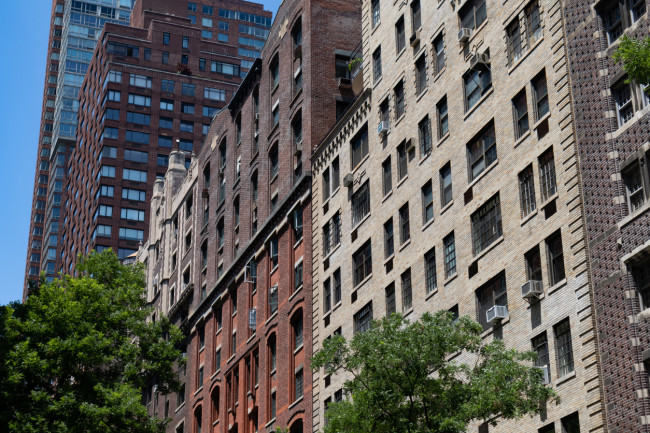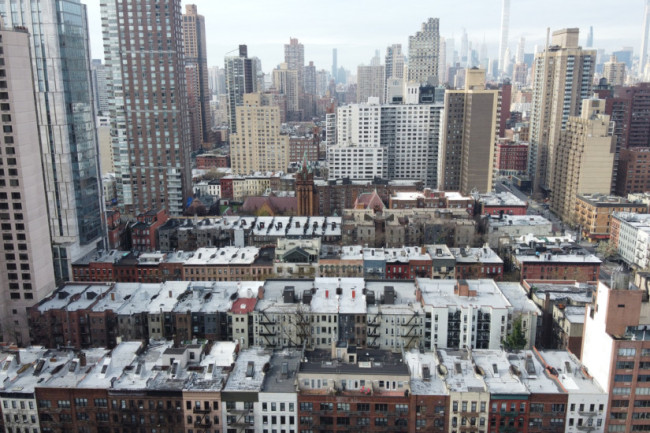Renew your lease with a rent increase or try your luck with a new place? It's a trickier decision this winter
- Instead of a seasonal drop NYC median rents broke or flirted with new records in January
- The size of rent increases for tenants with leases up for renewal also grew last month

With market rents so high, NYC landlords are trying to get more from their existing tenants.
FilippoBacci/E+ via Getty Images
Can you afford to stay or should you go? That’s a typical question for a New York City tenant who is facing a rent increase at lease renewal time. If that’s your situation, you’re probably weighing whether to commit to 12 months at a higher rent or take your chances on the market with a new lease.
Finding a new apartment in winter would normally present an opportunity to lock in a discounted rent. Not this season. The typical winter rent dip—when rents for new leases are traditionally lower than the rest of the year—was more of a blip this year.
Consider what happened last month: Manhattan’s median rent was the highest on record for the month of January and the third-highest overall; it increased 15.4 percent over January 2022 to $4,097, according to the Elliman Report. In Brooklyn, the median rent of $3,499 was the second highest on record. Over in Queens, median rent hit $3,369, the highest on record.
What is the average rent increase for NYC lease renewals?
With market rents so high, landlords are trying to get more from their existing tenants.
According to a new report from rental listing and building review site openigloo, landlords raised rents on market-rate apartments by an average of 8.1 percent in January—compared to increases of 3.2 percent and 5.2 percent in the two previous months.
Still 71 percent of renters renewing their lease with a rent increase saw their rent go up by less than 4 percent, according to the site.
It's typical for increases for lease renewals to lag rent increases for new leases; this incentivizes tenants to renew, says Allia Mohamed, openigloo’s CEO. And it’s worth noting that last month’s renewal increases are far less than the rent increases of 30 and 40 percent that tenants who got Covid deals saw at lease renewal time.
Mohamed points out that rent increases for lease renewals are more moderate these days—in line with increases for rent-stabilized apartments, she says.
When it makes sense to stay instead of move
Broadly speaking, she says, “if a landlord is pricing things right it makes sense for you to renew and avoid moving costs and paying a broker fee.” (Check out openigloo’s calculator to see how your rent compares to other market rate or rent-stabilized apartments in your area.)
Mohamed says openigloo is looking to add another feature that tells renters what sort of rent increases they can expect at lease renewal time in a particular building. The goal is to offer a building’s track record on past lease renewals.
Looking ahead to the coming months, Mohamed says tenants can expect to see rents continue to increase for lease renewals, however, the increases will be less extreme because “2023 is a clean slate and Covid deals have expired. Now we’re seeing what the real market is like,” she says.
What two-year leases tell you about the rental market
The rental market doesn’t always behave according to expectations, but there is a way to tell how tenants are feeling about rents.
Jonathan Miller, president and CEO of appraisal firm Miller Samuel and the author of the Elliman Report, says during the pandemic he started tracking the market share of two-year leases as a percentage of all new leases. He says he sees it as a way of forecasting which way tenants think rents are going.
“If tenants think rents are going up, they sign longer leases, and if they think rents are stable or declining, they go for a one-year lease,” he says.
Because if renters think they can do better somewhere else in a year, they will want to give themselves the option of moving when the lease is up. If not, they sign a two-year lease as a hedge against rent increases.
Historically, 90 percent of leases tend to be either one or two years, and one-year leases command a greater proportion, Miller says. But in March 2021, with the rental market rebounding, there was a surge in lease lengths as NYC tenants locked in deals apparently with the expectation that rents were not going to fall any further.
Now rents are much higher, and going higher still, but the trend for two-year leases is not as distinct. For example in January, the market share of Manhattan one-year leases was 49.2 percent and for two-year leases it was 43 percent. In Brooklyn the breakdown was 31 percent for one-year leases and 59.6 for two-year leases.
The share of two-year leases for both boroughs dropped from a year ago, a sign that tenants thought rents would stabilize or go down in January—but they didn’t. “Manhattan and Brooklyn rents set or came close to new records in January, which is somewhat surprising,” Miller says.
Queens renters, however, got it right: Market share of two-year leases in Queens was at its highest level in two years.
“There is not a big different between the share of one- and two-year leases, which doesn’t give us a clear picture of the future,” Miller says.
The challenges of being a renter now
Kunal Khemlani, an agent at Corcoran, estimates about 30 to 35 percent of his clients would like to get a longer lease, but most landlords are not willing to offer one.
Why wouldn’t a greater percentage of renters want longer leases to protect themselves from rent increases? Because there’s a lot of uncertainty about employment, Khemlani explains.
As for landlords, he says they’ve seen rents go up and up, making some unwilling to do two-year leases.
The upshot is that NYC renters are having a tough time, Khemlani says, and it’s not just because rents didn’t come down this winter. He says his clients have been stymied by landlords who warehouse market-rate apartments to create a feeding frenzy by releasing them to the market one at a time. Another issue his renters are facing: Landlords who accept multiple applications for a single listing.
That’s a problem for renters because a hard credit inquiry for a rental application can ding your credit score, at least in the short term. Instead, Khemlani suggests renters reach out to one of the three big credit reporting agencies to do a soft credit check, which does not harm your score. But give yourself time, he says. You won’t get the information you need immediately and you need to plan ahead.
Nothing is easy in the city, especially landing an apartment. As Khemlani puts it: “Finding a place to sleep is almost harder than finding a job.”
You Might Also Like




























